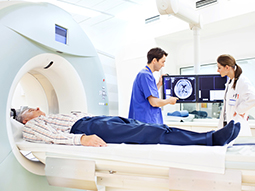What is it?
When you’re suffering from a lung disease, you can trust our interventional radiologists to diagnose and treat you using minimally invasive techniques that get you back to your normal life faster and with less pain.

Interventional radiology is a minimally invasive diagnosis and treatment option for patients suffering from illness or injury in their lungs.
As a safer, less painful alternative to surgery, interventional radiology uses advanced imaging to diagnose and treat a variety of lung conditions, including:
-
Bleeding
-
Blood clots
-
Fluid in the lungs
-
Hypoxia (trouble breathing)
-
Lung cancer
-
Lung masses
-
Pulmonary embolism (when a blood clot breaks free and travels to the lungs)
Most interventional radiology procedures for lung disease require only a small incision the size of a pinhole, which reduces your pain and risk for complication. Compared to traditional surgery, interventional radiology also allows for a quicker recovery, as most procedures allow patients to be discharged the same day of their procedure or within 24 hours, getting them back to the life and activities they love faster.
Interventional radiology for lung disease treatments
From diagnosing and treating lung cancer to reducing and removing life-threatening blood clots in or near the lungs, our interventional radiologists are experts at performing a full range of diagnostic and therapeutic procedures for lung disease.
Learn more about the interventional radiology treatment options for lung disease offered at MedStar Health below.
Fluid drainage
If you’re a lung cancer patient with excessive fluid accumulation around your lungs, our interventional radiologists may use a tunneled drainage catheter to drain fluid and relieve symptoms like pain and difficulty breathing. This minimally invasive procedure allows the fluid to drain while you are in the comfort of your own home.
Lung biopsy
A lung biopsy can help to diagnose or confirm a diagnosis of lung cancer or other lung disease. As a minimally invasive procedure, your interventional radiologist will remove tissue samples from your body under the guidance of advanced imaging. This allows them to diagnose the abnormality, which informs treatment options tailored to you.
Pulmonary arteriovenous malformation (PAVM) embolization
Although rare, a pulmonary arteriovenous malformation (PAVM) is a genetic condition that affects blood flow between the heart and the lungs. PAVM embolization is a minimally invasive procedure that blocks the abnormal connection between the pulmonary arteries and veins, reducing symptoms such as shortness of breath and bleeding while minimizing the risk of complications, including heart failure.
Pulmonary artery thrombolysis
When a blood clot or blockage forms in the lungs, you can experience sudden and severe chest pain and shortness of breath that can be fatal. Called a pulmonary embolism, this condition can be treated using pulmonary artery thrombolysis as an aggressive therapy option that effectively delivers clot dissolving treatments directly to the blockage.
Our providers

Expert interventional radiology care
Getting the care you need starts with seeing one of our interventional radiologists.
Our locations
Distance from Change locationEnter your location
MedStar Good Samaritan Hospital
5601 Loch Raven Blvd. Baltimore, MD 21239
MedStar Franklin Square Medical Center
9000 Franklin Square Dr. Baltimore, MD 21237
MedStar Harbor Hospital
3001 S. Hanover St. Baltimore, MD 21225
MedStar Union Memorial Hospital
201 E. University Pkwy. Baltimore, MD 21218
MedStar Georgetown University Hospital
3800 Reservoir Rd. NW Washington, DC, 20007
MedStar Washington Hospital Center
110 Irving St. NW Washington, DC 20010
MedStar Southern Maryland Hospital Center
7503 Surratts Rd. Clinton, MD 20735
MedStar Montgomery Medical Center
18101 Prince Philip Dr. Olney, MD 20832
MedStar St. Mary’s Hospital
25500 Point Lookout Rd. Leonardtown, MD 20650









